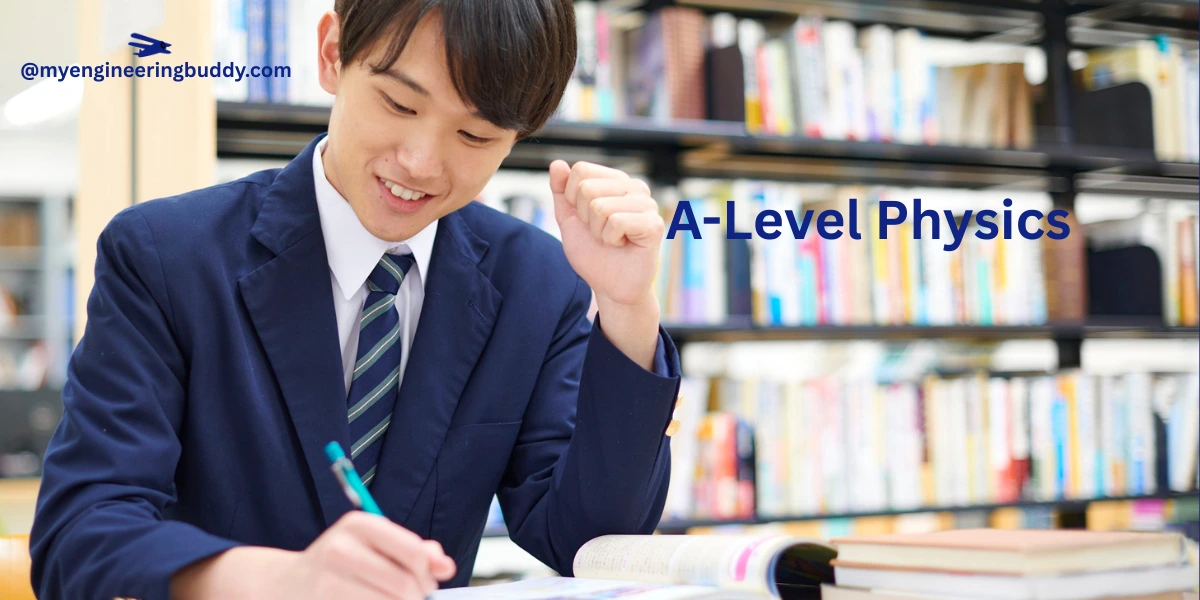A-Level Physics is challenging due to its abstract concepts and focus on application over memorization. Seeking personalized support, like online tutoring, can transform this struggle into mastery and unlock critical thinking skills.
Sarah had always been fascinated by the night sky. She’d spend hours looking through her telescope, dreaming of understanding the forces that governed the stars. When she started A-Level Physics, she was excited. But that excitement soon turned to anxiety. Concepts like quantum superposition and special relativity felt less like science and more like abstract philosophy. The equations on the board seemed to mock her. She wasn’t just struggling; she was starting to lose the very passion that had led her to the subject.
Why A-Level Physics Can Feel Like Climbing a Mountain
Sarah’s story isn’t unique. For many students across the UK, USA, and the Gulf, the jump from GCSE or IGCSE to A-Level Physics is a significant shock. Where GCSE often rewards memorization, A-Level demands deep conceptual understanding and mathematical fluency. Suddenly, concepts aren’t just descriptions; they are expressed through the language of calculus, a tool that many are learning concurrently. This dual challenge—mastering new physics concepts while simultaneously applying advanced mathematics—is a core reason for the subject’s notorious difficulty.
It helps to visualize exactly where this gap comes from. The table below contrasts the fundamental shifts in expectations between the two levels.
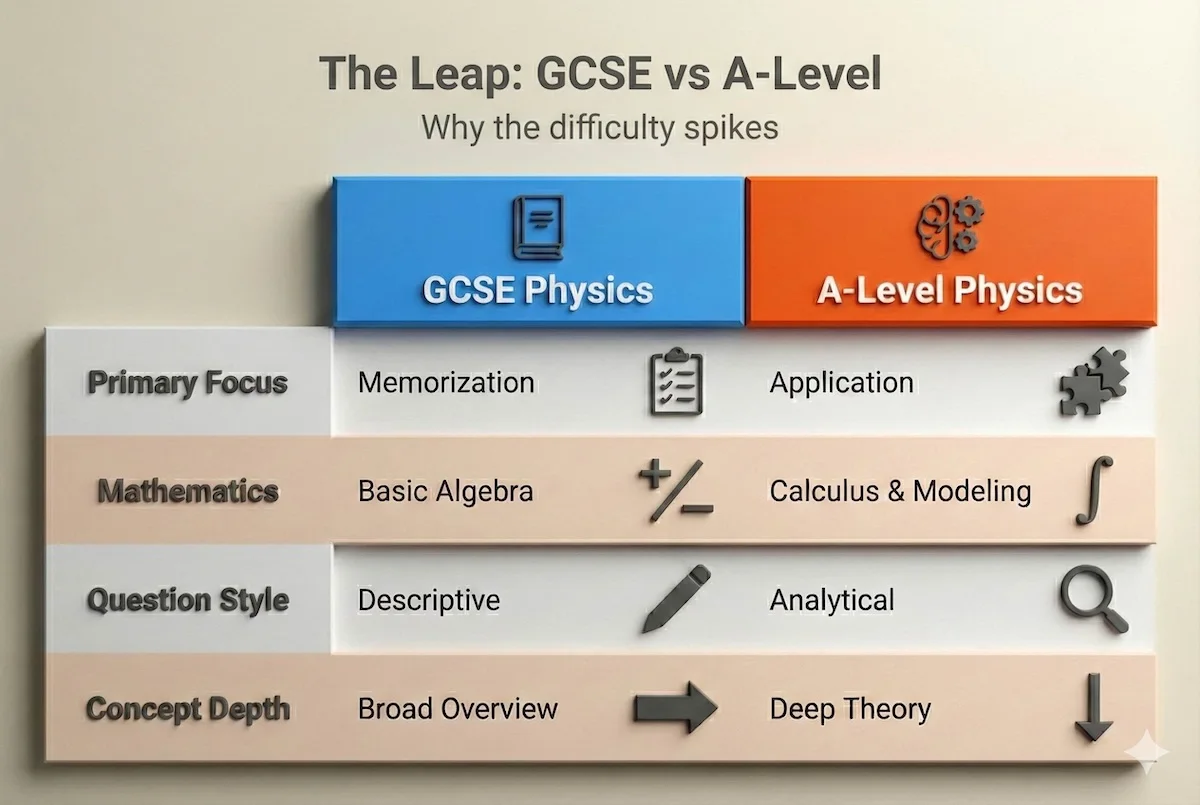
The jump from GCSE to A-Level involves shifting from memorization to deep application and calculus.
Recognizing these differences is the first step toward adjusting your study strategy.
The curriculum delves into the universe’s most counterintuitive corners. You’re asked to accept that a particle can be in two places at once (quantum superposition) or that time can slow down (special relativity). These ideas challenge our everyday intuition. The quality of A-Level Physics teaching is crucial here, but in a busy classroom, there’s often little time to pause and truly grapple with these mind-bending topics. Data confirms the difficulty. According to the UK’s Office of Qualifications and Examinations Regulation (Ofqual), in 2023, only 14.5% of students achieved an A* in A-Level Physics. This statistic isn’t meant to discourage, but to validate the feeling that yes, this subject is genuinely tough.
Numbers often speak louder than words when it comes to understanding exam difficulty. Let’s look at the breakdown of top grades.
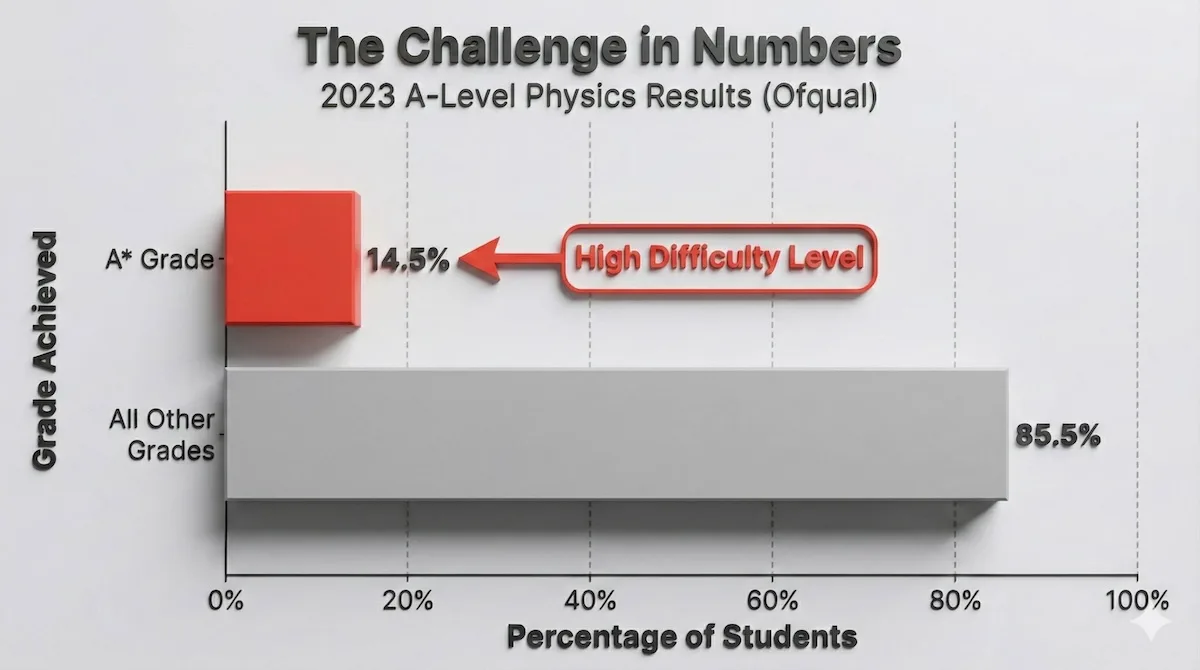
Ofqual data confirms the challenge: only 14.5% of students achieved the top grade in 2023
This data isn’t meant to scare you, but to highlight that achieving excellence requires a different approach than standard revision.
The Real Goal of A-Level Physics Teaching: Building a Scientist’s Mindset
The ultimate goal of an A-Level Physics curriculum isn’t just to teach facts; it’s to cultivate a scientific mindset. It trains your brain to think critically, to break down complex problems into manageable parts, and to approach challenges with logic and creativity. An excellent A-Level Physics teacher doesn’t just give you the answers; they guide you on the path to finding them yourself.
Think of it like learning to play a musical instrument. You can memorize all the scales and chords (the formulas), but that doesn’t make you a musician. To create music, you need to understand theory, practice consistently, and learn how to improvise. A-Level Physics is the same. It’s about learning the “music” of the universe and applying it to compose elegant solutions to complex problems. This analytical skill is precisely why universities and employers value physics qualifications so highly.
To understand this transformation, we can visualize the journey from novice to expert using the musician analogy.
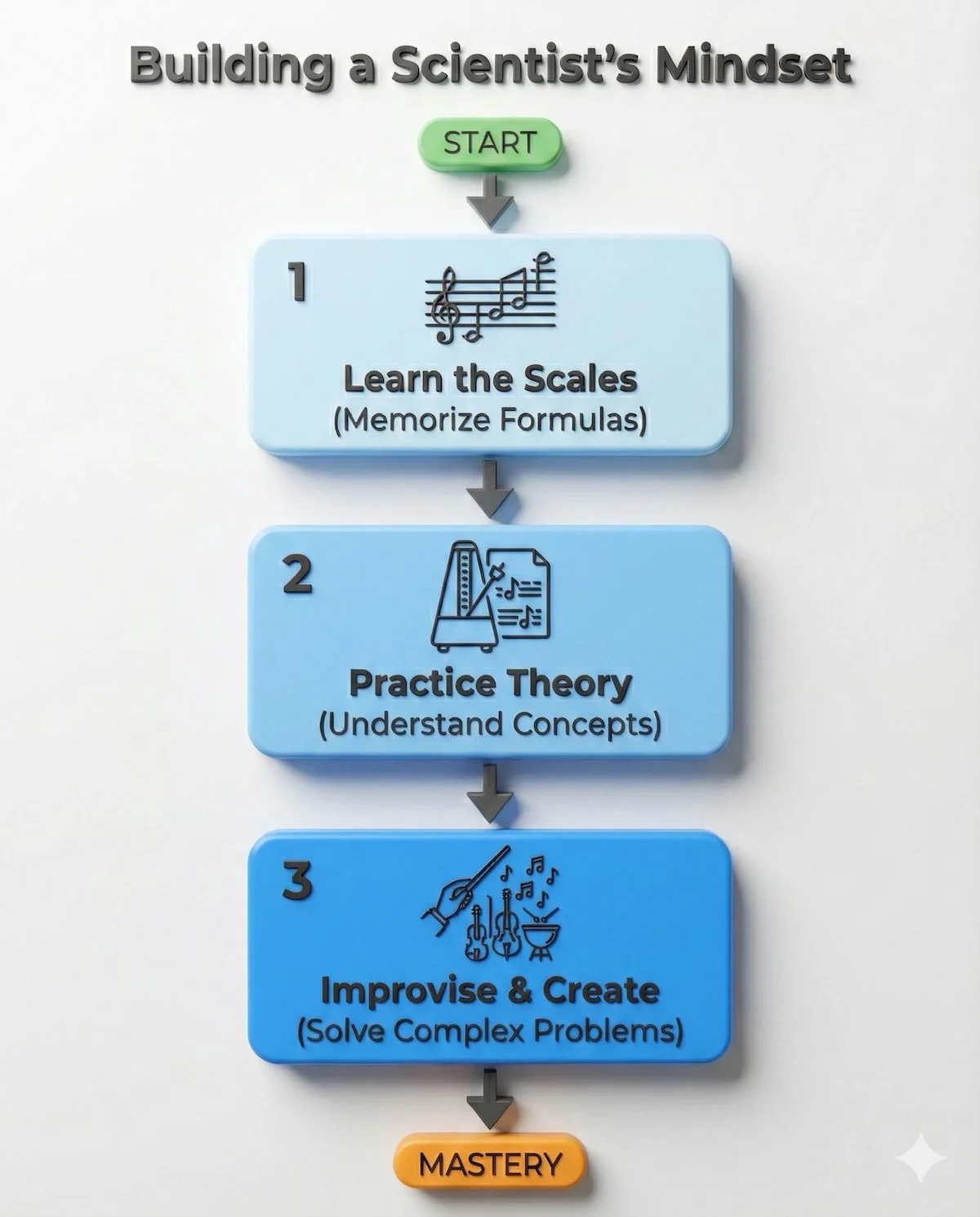
Like learning music, physics requires moving beyond memorizing ‘scales’ to composing your own solutions.
Your goal is to reach that third stage, where you can fluently apply concepts to unseen scenarios.
Bridging the Gap: When to Seek Extra Support
Even with great classroom instruction, gaps in understanding can appear and widen quickly. Maybe it’s a specific topic like electromagnetism that just won’t click, or perhaps the pace of the class is too fast to absorb the details of nuclear physics. With class sizes often exceeding 25 students, it’s impossible for a teacher to address every individual question. This is where many students start searching for A-Level Physics homework help, hoping for a quick fix.
They might turn to online forums or video platforms. While these can be useful, they often present a one-size-fits-all explanation that might not address a student’s specific point of confusion. Imagine struggling with Faraday’s Law of Induction and finding a forum thread where ten different people explain it in ten different ways, some of which are subtly incorrect or apply only to niche cases. This can create more confusion than clarity. When a student needs A-Level Physics hw help, what they truly need isn’t just an answer; they need a dialogue to understand the why behind the method. Similarly, when seeking A-Level Physics assignment help for a larger project, the goal should be to master the concepts for the long term, not just to complete a single task for a grade.
If you are unsure whether your struggles are normal or a sign you need help, use this simple check.
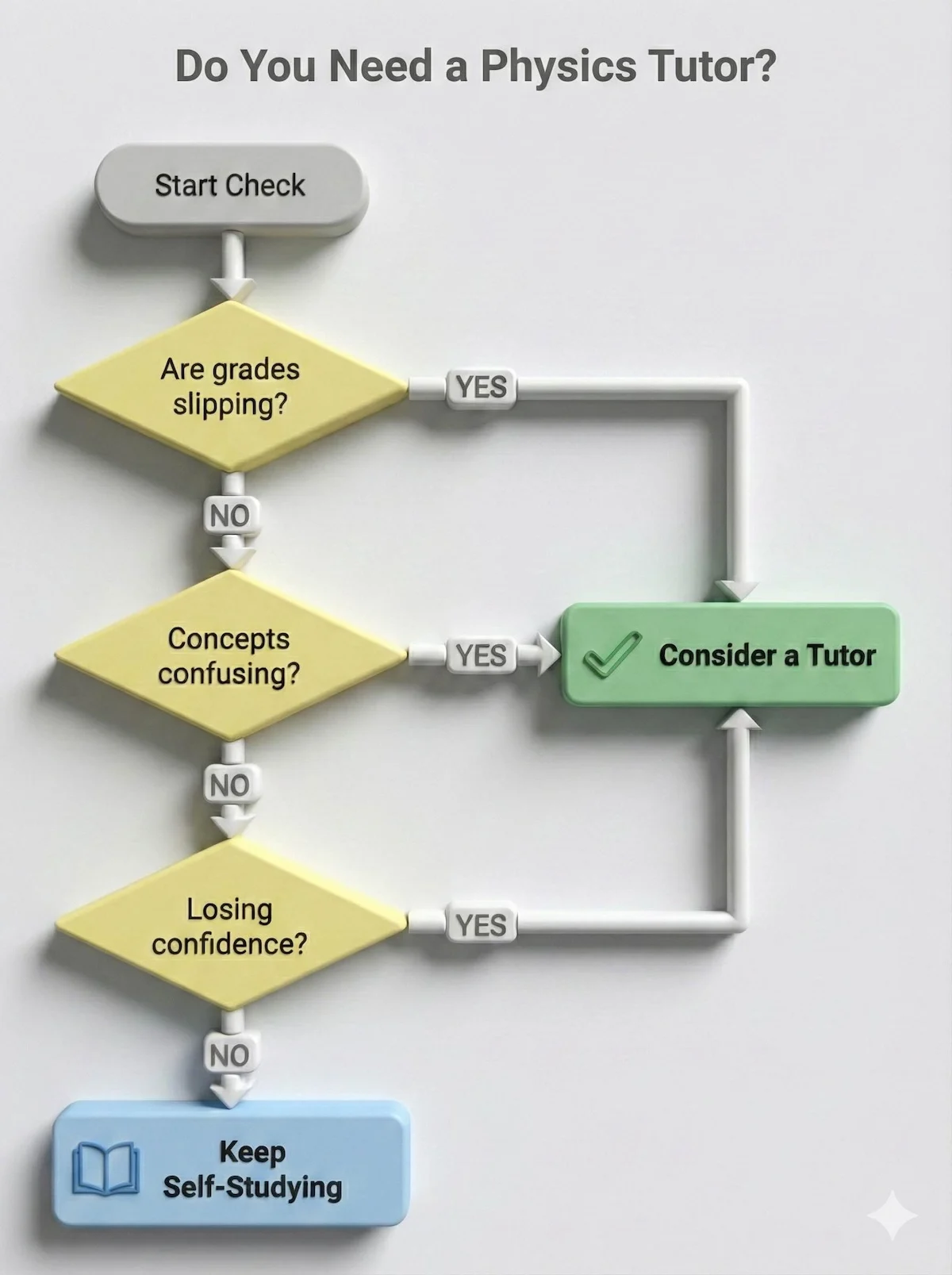
Follow this simple decision path to see if personalized tutoring is the right step for you.
If you landed on ‘Consider a Tutor,’ acting early can prevent minor gaps from becoming major obstacles.
A Personal Guide Through the Cosmos: The Power of One-on-One Tutoring
When generic resources aren’t enough, personalized support can be a genuine game-changer. This is where dedicated A-Level Physics tutoring shines. A private tutor acts as a personal academic guide, tailoring their approach to your specific learning style, identifying your unique strengths, and patiently working through your weaknesses. They can slow down, revisit foundational concepts that might have been shaky from the start, and offer alternative explanations until everything clicks into place.
The revolution in A-Level Physics tutoring online has made this specialized help more accessible and powerful than ever before. Modern online platforms are not just video calls; they are sophisticated learning environments. They feature interactive digital whiteboards where student and tutor can sketch diagrams and solve equations together in real-time. Sessions can be recorded, allowing students to revisit complex explanations before an exam. This flexibility means a student in Dubai can connect with a top physicist from Cambridge, fitting sessions around their own schedule. Research from the Education Endowment Foundation has shown that this kind of consistent, one-on-one tutoring can boost a student’s academic progress by as much as five months. It transforms learning from a passive reception of information into an active, engaging conversation with an expert A-Level Physics tutor online.
How to Find the Right A-Level Physics Tutor for You
So, how do you find the right person to guide you on this journey? When you decide to hire a A-Level Physics tutor, you’re looking for more than just someone who knows the subject. You’re looking for a guide who can make the subject come alive.
Key Qualities of a Great Tutor
- Deep Subject Expertise: They should have a profound understanding of physics that goes far beyond the A-Level textbook. Often, the best tutors have degrees in physics or engineering from top universities.
- Proven Teaching Ability: Knowledge is one thing, but the ability to explain it clearly and patiently is another. A great A-Level Physics tutor can break down the most complex ideas into simple, digestible concepts.
- Adaptability and Patience: They should be able to adapt their teaching style to fit your needs and be patient as you work through difficult problems. Learning isn’t always linear, and a good tutor understands that.
- Passion for Physics: Enthusiasm is contagious. A tutor who is genuinely passionate about physics can reignite a student’s own interest and curiosity in the subject, making learning feel less like a chore and more like an adventure.
Platforms that vet their experts and connect students with qualified professionals can be an invaluable resource in this search, ensuring you find someone with the right combination of knowledge and teaching skill.
More Than an Exam: Skills You Gain from A-Level Physics Tutoring
The benefits of mastering A-Level Physics, especially with the help of a tutor, extend far beyond achieving a top grade. The process itself builds a powerful and versatile skillset that is in high demand in the 21st-century economy, forming the foundation for some of the world’s most innovative and rewarding careers.
The Lifelong Toolkit Physics Provides
- Analytical and Critical Thinking: Physics trains you to deconstruct complex systems, analyze information from first principles, and evaluate evidence with a rigorous, critical eye.
- Advanced Problem-Solving: You learn how to approach unfamiliar, multi-step problems systematically, a skill that is essential in any field from software engineering to strategic management.
- Mathematical Fluency: The subject forces you to become fluent in the language of mathematics, making you comfortable with abstract models, data analysis, and quantitative reasoning.
- Resilience and Perseverance: Grappling with difficult physics problems builds mental toughness. It teaches you the value of persistence, iteration, and intellectual curiosity in the face of a challenge.
These skills are a passport to a huge range of prestigious and rewarding careers. An A-Level in Physics is a foundational requirement for all branches of Engineering (Civil, Mechanical, Electrical, Aerospace), Medicine (where it’s crucial for understanding medical imaging and biomechanics), and of course, scientific Research. But its utility goes even further. The quantitative skills are highly sought after in Finance, where physicists work as “quants” developing complex financial models. They are also essential in Data Science and AI, where understanding modeling and systems is key. A strong physics background signals to any university or employer that you are a sharp, logical, and resilient thinker.
What exactly are you building during those late-night study sessions? Here is your lifelong professional toolkit.
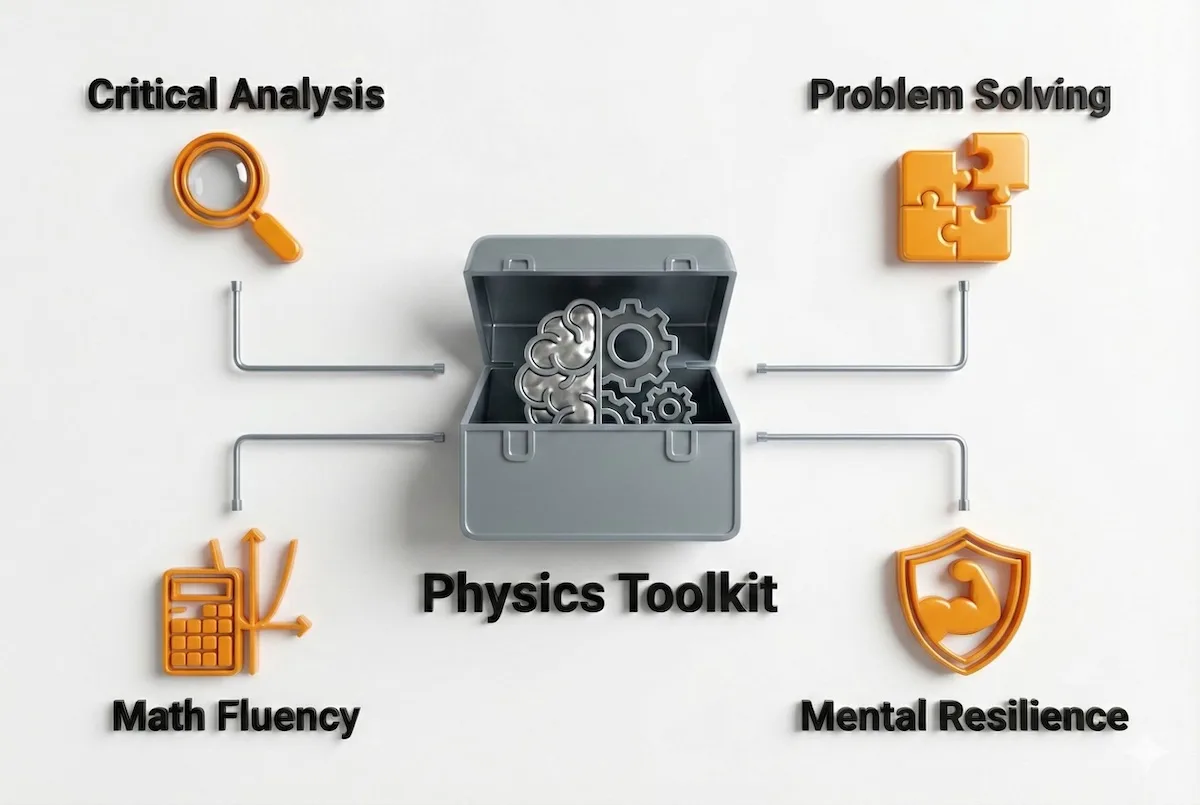
Physics equips you with a versatile toolkit of analytical and resilient thinking skills valued by employers.
These are the assets that will serve you in engineering, finance, research, and beyond.
Your Journey Into Physics Starts Now
Let’s go back to Sarah. Feeling defeated, she and her parents decided to find an A-Level Physics tutor online. Her tutor, a PhD student from a top university, didn’t just give her answers. He asked questions. He used real-world analogies that made abstract concepts tangible. Slowly but surely, the fog of confusion began to lift. Sarah wasn’t just learning how to pass her exams; she was learning how to think like a physicist. She rediscovered the wonder she felt when looking through her telescope, now armed with the understanding to appreciate the cosmos on a much deeper level.
The path through A-Level Physics is undoubtedly challenging. But it’s a challenge that forges incredible skills and opens doors to a universe of opportunities. You don’t have to walk it alone. With the right support and a resilient mindset, you can not only conquer the subject but also unlock a lifelong passion for understanding the world around you.
Frequently Asked Questions (FAQs)
Q1. How much does A-Level Physics tutoring usually cost?
Expert tutoring typically ranges from $20 to $40 per hour, depending on the complexity and the tutor’s qualifications.
Q2. Is online tutoring as effective as in-person tutoring?
Yes, for many students, online tutoring is equally or even more effective due to its convenience and access to a wider pool of experts.
Q3. When is the best time to hire a tutor for A-Level Physics?
It’s best to start as soon as you feel you’re falling behind, rather than waiting until just before exams.
Q4. Can a tutor help with my specific exam board (e.g., AQA, OCR, Edexcel)?
A qualified tutor will be able to tailor their teaching to the specific curriculum and requirements of your exam board.
Q5. What is the main benefit of one-on-one A-Level Physics tutoring?
The primary benefit is personalized attention that is focused entirely on your specific learning needs and pace.
Q6. How do I know if I really need an A-Level Physics tutor?
If your grades are slipping, you feel constantly confused, or you’re losing confidence in the subject, a tutor can help.
******************************
This article provides general educational guidance only. It is NOT official exam policy, professional academic advice, or guaranteed results. Always verify information with your school, official exam boards (College Board, Cambridge, IB), or qualified professionals before making decisions. Read Full Policies & Disclaimer , Contact Us To Report An Error


